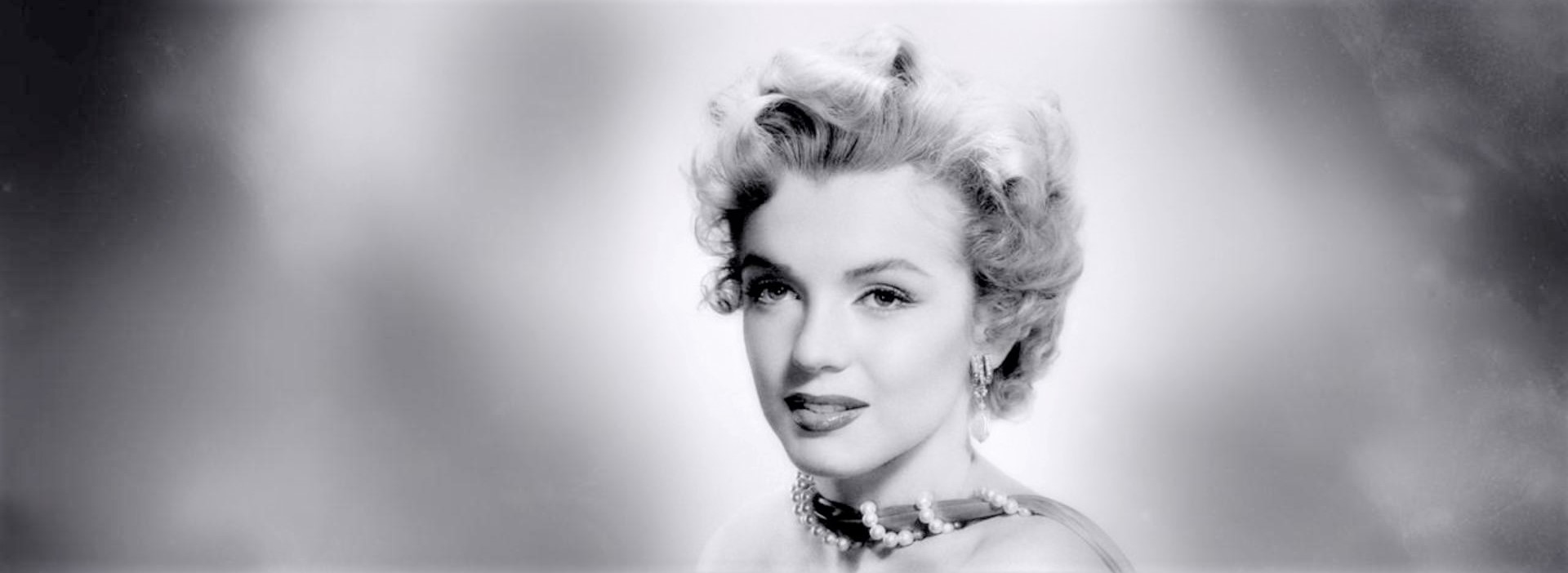All About Eve
13 October 1950
Marilyn’s Impression Trilogy, Movie No. 2
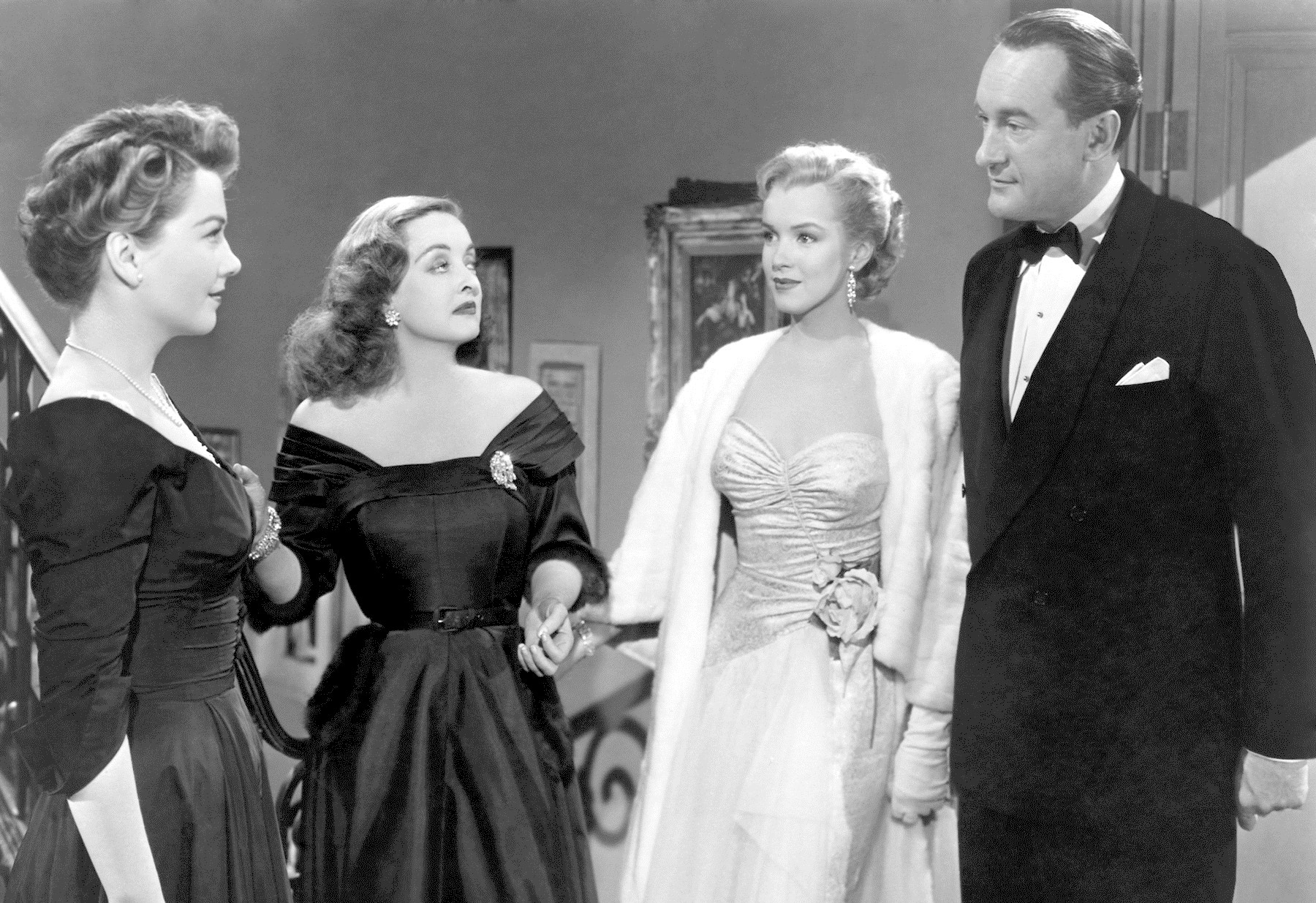
For an offering of cinema, All About Eve is arguably one of the least cinematic pictures ever produced. For all intents and purposes, and perhaps rightfully so, since it revolves around thespians whose lives revolve around the theater, it is a three act play captured on black and white film. It features no real action, unless you consider walking from room to room, walking up and down stairs or spinning around to deliver a pithy line to be action. Within a visual medium like the movies, All About Eve is about as non-visual as a movie can get. The camera set-ups are static and so are most of the scenes. The only aspect of the movie that is not static is the dialogue, the words, the considerable amount of pithy repartee, unfriendly and sarcastic dialogue of the critical sort designed to stab to hurt to manipulate
No doubt the word daggers, those sharp verbal knives wielded by each and every character in the movie, male and female, helped garner All About Eve the fourteen Academy Award nominations that it received in 1951, a record at the time. All four of the main female actors, Bette Davis, Anne Baxter, Celeste Holm and Thelma Ritter, were nominated for Oscars but each went home empty handed; however, the movie won six Oscars: George Sanders won Best Supporting Actor; Joseph Mankiewicz won two awards, Best Director and Best Screenplay; Edith Head and Charles La Maire won Best Costume Design in a Black and White Film; Thomas Moulton won Best Sound Recording; and last but not least, the Academy declared All About Eve to be the Best Picture of the Year.
The movie won six Golden Globe awards: Best Picture, Best Director and Screenplay, Best Actress for Davis, Best Supporting Actress for Ritter and Best Supporting actor for Sanders. Many cinema experts consider All About Eve to be one of the best movies ever produced by Hollywood, maybe even the best. Amazing praise, considering the number of movies produced before and after 1950. But I would hasten to add this obvious clarifier: female. If All About Eve is anything, it is a female movie, a movie about females, made for females. I wanted to use the term gal but thought better of it. Some movie historians and critics categorize All About Eve as Bitch Cinema; but I would not go quite that far.
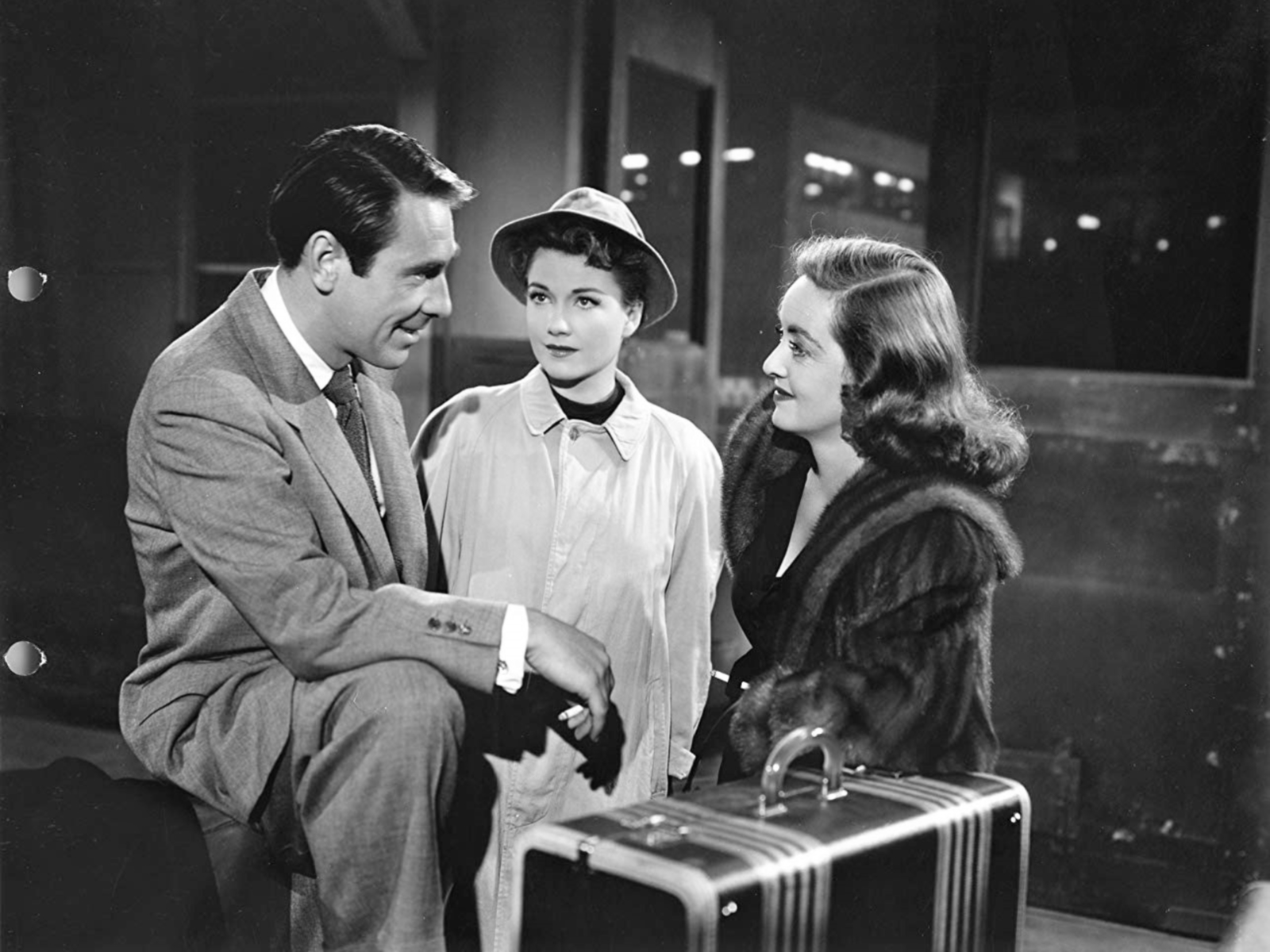
Our uncinematic movie, which tells us all about Eve, is often called a satirical dramatic-comedy but the term dramatic-comedy is virtually meaningless, at least in my humble opinion. A movie that strives for realism, strives to depict life au naturel, must include the serious aspects of life, the drama, but also the funny aspects of life, the comedy. A drama without comedy is a tragedy and a comedy without drama is a farce. Although comedy includes satire, satire suggests to me a form of farce in which questionable behavior or vices are ridiculed with the intent of effecting a change, either in a specific person or a gaggle of persons or even society as a whole; and while our three-act play pokes fun at certain types of persons, certain behaviors and attitudes, it is not a satire, not even in the broad sense. Since I only laughed about five times during the entire movie, I hesitate to call it a comedy. No doubt, All About Eve is primarily a drama, a female drama, that leans acutely in the direction of tragedy. In fact, for my dime, a better title for the movie would have been The Tragedy of Eve.
The plot of our three act play, and a relatively interesting plot at that, has Margo Channing, an aging stage actress appearing in a Lloyd Richard’s play, Aged In Wood, directed by Bill Sampson, Margo’s male friend, lover and de facto fiancé. Lloyd’s wife, Karen, who is also Margo’s best friend, introduces the actress to an adoring fan, Eve Harrington. Eve appears to be an incredibly sweet and unselfish young woman who is utterly devoted to Margo and follows her from city to city. Eve attends each and every Margo Channing performance; and the flattery that Eve heaps on Margo is so gratifying to the egocentric actress that she accepts it as an honest expression of Eve’s true feelings. And too, Eve’s life story, as she narrates it, is so pitiable, full of loss and disappointment and suffering, that Margo is touched. She accepts the young woman into her life immediately. Eve ingratiates herself and becomes Margo’s assistant although her longtime friend, Birdie, already functions as a combination maid and assistant. Birdie is really Margo’s keeper. Unlike Margo’s other close friends, Birdie does not believe Eve’s piteous tale or that her professed love for Margo is real. Best friend Karen, also touched by Eve’s story, sincerely wants to help the young woman realize her life’s goal: to have a stage career. As fate would have it, Margo’s understudy becomes pregnant. During a brief conversation with Karen, Eve suggests that creating a new understudy is not necessary since she already knows the part and staging very well. Karen convinces Lloyd and Max Fabian, the play’s producer, to anoint Eve the understudy. When Margo misses a performance, due to Karen’s betrayal, Eve immediately steps in and delivers a magnificent performance. Her performance is so good that she receives the prestigious Sarah Siddon’s Award for Outstanding Achievement in Theater which, of course, leads her to Hollywood. In the end, the theater critic, Addison DeWitt, whom Eve also manipulates to achieve her goals, entangles her in the spidery web of lies she’s spun and takes control of her and her career.
During Hollywood’s Golden Age, when major studios like 20th Century-Fox and several others virtually enslaved their contract actors, actresses and even their directors, George Cukor, Joseph Mankiewicz and Joshua Logan purportedly treated actresses better than most of the studio’s other chauvinistic directors. Mentioned to Mankiewicz on one occasion at least, he agreed and commented, slightly paraphrased: George befriends them; I bed them. That was Mankiewicz’s way of acknowledging and commenting on Cukor’s alleged homosexuality. According to most accounts, Joe was an incorrigible philanderer who claimed that he loved all women and their intricate minds. He found them more intelligent and more complex than men, generally just more interesting. That being the case, why then are the women in All About Eve presented in mostly an unfavorable manner. I found it downright difficult to like any of them.
Margo is arrogant, angry and egocentric. She wallows in self-pity and is, at times, just downright mean. I know I’m suppose to sympathize with her, feel her pain: she’s forty, beginning to look slightly frumpish, beginning to feel slightly insecure about her here and now and certainly about her future. But the caustic lines that tumble from Margo’s lips, despite their often insightful quality, are intended to inflict pain and as such make her slightly contemptible. She needn’t worry about her future as an actress: she could become a poison pen, a playwright or a novelist, for sure a political malcontent or a radical feminist. She is just not a happy woman.
Her friend, Karen, on the other hand, is happy; and she appears to be as sweet as pure cane sugar, a trait that bothers Margo, along with Karen’s marital status. Margo wants to be a married woman; so, in order to teach her friend a lesson about humility, Karen betrays Margo. In some ways, Karen is even more contemptible than her friend. At least Margo is honest while Karen is deceitful.
And yet, Eve Harrington must be one of the most deplorable and insidious women ever depicted in a movie. A master manipulator and liar, she acts only in her self interest and is the type of person that will do anything to attain her goals: lie cheat and steal and each at the same time. But you have to give Jezebel her just due: she is also extremely intelligent and a consummate actress.
While Birdie is arguably the only likable gal in the movie, she, too, is jaded and cynical, untouched by Eve’s piteous life story.
I hesitate to call two of the men in our female drama weak; but to a certain extent, they are. While Bill Sampson and Lloyd Richards are fundamentally decent guys and utterly devoted to the theater, they are also pawns in a female chess game. As Karen sarcastically observes, both Bill and Lloyd will do as they are told. Like director and playwright, the producer of Aged in Wood, Max Fabian, is also a male pawn, one easily manipulated by the female characters; but he doesn’t harbor any artistic pretenses: he’s involved in theater for profit. While Bill, Lloyd and Max are certainly likable fellows, there’s Addison DeWitt, an aloof, cynical critic who considers himself to be indispensable to the theater and a master puppeteer. He is not weak and he is not likable. Addison maintains a thick catalogue raisonné of human frailties. Everything is grist for his mill. Addison DeWitt is a misanthrope and a skunk.
Considering all the accolades heaped on All About Eve, you’d expect everything about the movie to be superlative and despite its lack of any real action and its static quality, there’s really not much to criticize. The music is complimentary but not overpowering and the dialogue is some of the best ever written, even though I’ve never met anyone who is capable of such repartee or who speaks quite like the folks in this movie. Some of the verbal explosions are so vitriolic they border on surrealism.
Most critics contend, and I agree, that the performances rendered by each and every member of the cast are tiptop, if slightly over wrought at times. Gary Merrill and Hugh Marlowe deliver good supporting performances as Bill and Lloyd, respectively; and with his thick Russian accent, Gregory Ratoff deftly handles Max Fabian who is primarily a caricature of a crude, rude and unattractive producer.
Celeste Holm’s portrayal of Margo’s best friend, Karen, represents the one weak performance but only as hers relates to the others in the movie. Thelma Ritter, for all intents and purposes, is Birdie.
Anne Baxter’s slightly diffident and breathless portrayal of the scheming and heartless Eve, while not quite as powerful as her costar’s portrayal of Margo, Anne’s performance is nonetheless, quite good and essential to the movie. Her physical softness and the innocence Anne projects as Margo’s adoring fan, makes Eve’s deception of the hard-boiled and worldly diva, Margo, all the more plausible and convincing. A character with enough apparent strength to compete with Margo would never have been accepted into her inner circle. However, when the role requires Eve to become the tough, insatiably ambitious woman intent on replacing Margo, Anne delivers.
Likewise, George Sanders and Bette Davis also deliver. Their performances as Addison and Margo make All About Eve the type of movie that is worth screening sixty-five years after its initial release. In the hands of lesser actors, characters like Addison and Margo, already hovering around caricatures, could have been reduced to the level of cartoons. It’s not only the exaggerated nature of the misanthrope and the diva, it’s the unnatural quality of their dialogue, the words used to express themselves and the syntax of their sentences. Some might argue that their association with acting and the theater has colored their speech; but I’ve seen and heard interviews with actors: they don’t express themselves in a way that even approximates Addison and Margo. Actors speak with that type of precision when the lines have been written for them and the lines in All About Eve that flow effortlessly from the mouths of Addison and Margo, and to a lesser degree from Bill Sampson, have obviously been written.
Even so, that fact makes the performances of George and Bette that much more amazing. They are simply mesmerizing. There are several terrific scenes in our female drama; but one that is particularly so occurs during Bill’s party. Margo forces the pianist to play Liebestraum over and over. She is drinking herself into a stupor of self-pity; but she is also deriving a considerable amount of pleasure from her pain. Bette Davis transmits this fact with the almost sexually suggestive way she delivers her lines in response to Bill’s humorously guarded reproach of her intoxication. It’s a scene requiring subtlety and yet it is also a tour de force. As Addison later comments about Margo: You’re maudlin and full of self-pity. You’re magnificent.
According to the documentary, Back Story: All About Eve, Bette Davis was not Mankiewicz’s first choice to portray Margo. That honor went to Claudette Colbert; but due to an accident while filming Three Came Home, an accident that injured Claudette, she could not accept the role. Both Mankiewicz and the movie’s producer, Darryl Zanuck, agreed that Bette Davis was perhaps the only actress capable of playing Margo. The problem? Bette and Darryl hated each other. When she finally accepted the role of Margo, after a personal telephone call from Zanuck, Bette was a mere forty-two years old. She had recently starred in a series of relatively unsuccessful movies, and her career was in trouble. But her performance as Margo, now considered by many cinema pundits to be her best, rescued her career. Bette and Margo apparently had much in common. According to Roger Ebert:
Her veteran actress, Margo Channing … was her greatest role; it seems to show her defeated by the wiles of a younger actress, but in fact marks a victory: the triumph of personality and will over the superficial power of beauty. She never played a more autobiographical role.
Celeste Holm was Mankiewicz’s first choice to play Karen; but she had walked out on her Fox contract due to a dispute with the studio head, Darryl Zanuck. Obviously, there is a pattern of friction between actresses and Zanuck; but when Zanuck agreed to rehire Celeste Holm, upon the insistence of Mankiewicz, the actress was particularly gratified. By the way, Bette and Celeste became embroiled in a feud during filming. And finally, the young blonde terminated by Zanuck in 1947 because he considered her to be unphotogenic was Mankiewicz’s only choice to play the beautiful Claudia Caswell. Unphotogenic? A perfect segue into the dumb blonde’s appearance.
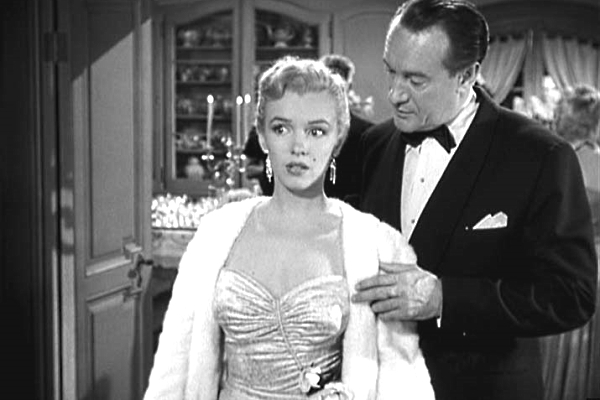
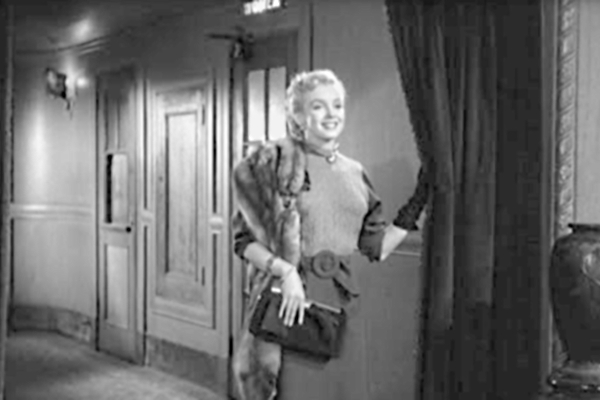
In her role as s Claudia Caswell, described by Addison as an actress, a graduate of the Copacabana school of dramatic art, Marilyn doesn’t so much perform in All About Eve as she simply appears. She delivers lines and she delivers them well; but she appears as a contrast to the darkness of both Eve and Margo. The camera set-ups place Claudia center frame. She is dressed differently than those surrounding her. Her clothes are bright; theirs are dark. She is blonde; they are brunette; She is incandescent; they are dull. Claudia is the very embodiment of naïveté, something Eve has relinquished, and youthful beauty, something Margo has lost with the passing of time. These visual differences are not as pronounced in the theater lobby scene with Addison and Margo in which Claudia’s fear of auditioning causes her to vomit, an instance of art imitating life since Marilyn often vomited before performing a scene due to her stage fright and her feelings of inferiority. Mankiewicz contrasts Claudia’s lack of confidence and her vulnerability with Margo’s bravura and toughness.
Eve can never recapture her youthful innocence, and Margo can never recapture her youthful beauty. In the end Margo reaches a certain peace with her age; but Eve meets her fate in Phoebe, a young woman who, like Eve before her, desires stardom and fame more than anything in the world, regardless of the cost. The movie ends as Phoebe, wearing an article of Eve’s clothing, a re-imagined earlier scene with a piece of Margo’s clothing and Eve, steps before a series of mirrors while holding Eve’s Sarah Siddon’s Award. The mirrors are so arranged that they create a mise en abyme, a Droste effect, infinite reflections of the young Phoebe, which represent the virtually infinite number of young women waiting in the wings for their chance to achieve stardom and fame. The process of manufacturing stars will begin anew and perpetually. Whether the young woman is Eve, Claudia or Phoebe, is there any difference?
